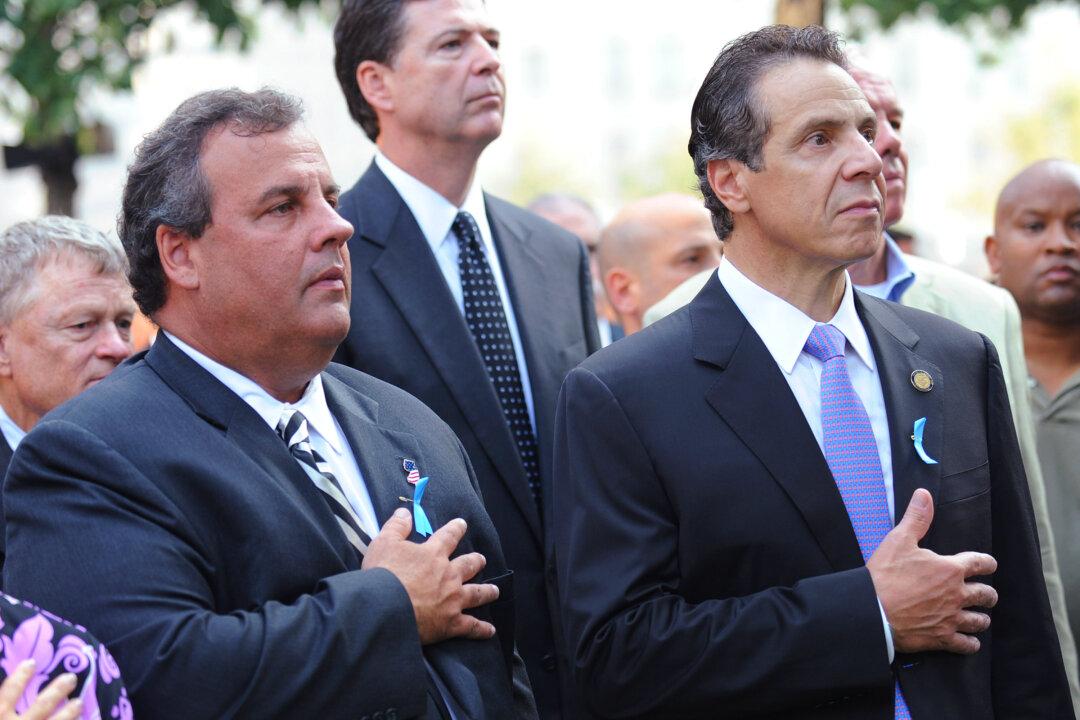For years, studies have ranked New Jersey and New York among the highest-taxed and least business-friendly states. An October report by the nonpartisan Tax Foundation placed the two states in a dead heat for the worst business-tax climates in the country, giving a slight edge to the Garden State.
“New Jersey Governor Chris Christie has vowed to keep New Jersey out of last place,” the report noted, but it added that if New York made the smallest improvements, it could crawl out of the bottom ranking. Indeed, the neighboring Empire State—long considered the epitome of big government taxation—could soon become more tax-friendly than New Jersey.
Democratic New York Gov. Andrew Cuomo’s proposed $2 billion package of tax cuts and reforms is winning praise even from Tax Foundation analysts. Meanwhile, Christie, a Republican, is grappling with a budget weighed down with enormous legacy costs—including a crushing pension debt—which leave little room for trimming taxes without big spending cuts elsewhere. Even as Christie argues for tax cuts, New Jersey Democrats are proposing increases.
Cuomo’s tax-cut package is inspired in part by recommendations from a bipartisan reform commission headed by former state Comptroller Carl McCall, a Democrat, and former Gov. George Pataki, a Republican. Cuomo’s plan would reduce the corporate income tax by about $350 million annually and simplify the tax code for banks. It would also raise the amount of income excluded from New York’s estate tax to $5.25 million, almost matching the federal exclusion. Currently, New York exempts only $1 million of an estate from taxation. Cuomo wants to ensure that people don’t have to “leave the state to die.”
In addition, the New York plan would provide property tax relief in the form of an income tax credit to homeowners earning less than $200,000, and a similar credit for low- and middle-income renters. When phased in, these two tax cuts alone would total more than $1 billion, though the Cuomo plan would do nothing about the state’s sky-high top income tax rate of 8.82 percent.
Cuomo has aggressively lobbied for his tax package, which was, he said, was “put together to pass.” He proposes to pay for it by holding spending increases to fewer than 2 percent annually. That’s an ambitious goal in a state where a big chunk of the state budget goes to education funding, which Cuomo wants to increase, and to Medicaid, the costs of which are rising. But Cuomo’s tax-cut bill would pressure a profligate state Legislature to live within its means.
Jersey’s Road
Christie’s circumstances are starkly different. He’s proposed income tax reductions to ease the state’s giant tax burden, while the biggest proponent of tax relief among New Jersey Democrats, Senate President Stephen Sweeney, wants property tax cuts instead. So far, Christie has achieved only modest business tax reductions.
Now the Jersey governor has a bigger problem: the state budget. Christie has held spending in check for four years, but costs are exploding. The state’s pension-reform legislation, passed three years ago, includes a requirement that New Jersey make its annual payments into the pension system—Jersey governors had contributed little or nothing for years. Next year alone, Christie must spend $2.25 billion on pensions, and that figure could grow by another $1 billion in two years, gobbling up most of the state’s projected revenue increases.
Jersey’s left-leaning Democrats are once again trying to boost revenues. They would resurrect an expired surcharge on higher-income taxpayers originally signed into law by former Democratic Gov. Jon Corzine, which increased tax rates to above 10 percent on those earning more than $500,000 annually. Corzine’s surcharge came in addition to a hike by his predecessor, Democrat Jim McGreevey, to the top tax rate, which jumped to 8.7 percent. If Jersey reinstates the Corzine surcharge, those earning half a million or more in income would wind up paying tax rates 60 percent higher than they were before McGreevey took office 12 years ago.
Cuomo’s tax package could make New York, by comparison with Jersey, a much more attractive place to die. New Jersey is one of only two states with both an inheritance tax (which beneficiaries must pay) and an estate tax (which taxes the deceased’s estate). You could say that Jersey taxes both ends of the exit strategy known as death. If Cuomo’s tax plan is passed, rich residents of Jersey (which excludes just $675,000 from taxation) who don’t want to move to distant, tax-friendly states such as Florida or Texas might simply migrate across the Hudson to New York, where they’d still face some significant local taxes but would escape the onerous Jersey death-tax regime.
Cuomo and Christie both harbor aspirations to higher political office, and it’s difficult not to view their current face-off in these terms. Cuomo seems to be positioning himself for 2016 as a moderate Democratic alternative to presidential candidates who might lean much further left. His billion dollar-plus tax cut would allow him to stand out among the current crop of Democratic governors.
Christie was perhaps the leading contender for the Republican 2016 presidential nomination before the so-called Bridgegate scandal, and he remains a powerful political presence. But other Republican governors who might run against him have been cutting taxes aggressively; indeed, last year, 16 of the 18 states that trimmed their taxes were led by Republicans, according to the American Legislative Exchange Council. That alone might make Christie’s road to a presidential nomination tougher than it looks.
Leading the least business-friendly state in the country doesn’t help, either.
Steven Malanga is senior editor of City Journal and a senior fellow at the Manhattan Institute. His latest book is Shakedown: The Continuing Conspiracy Against the American Taxpayer. This article originally appeared on the Manhattan Institute’s City Journal website.




